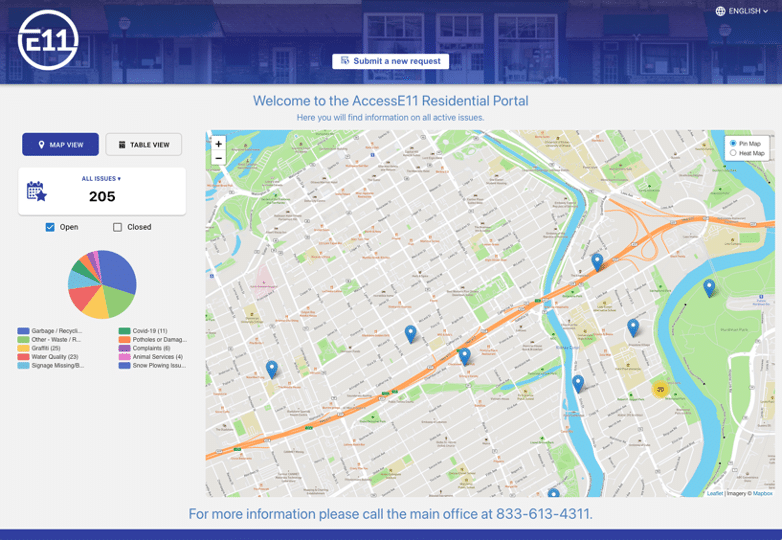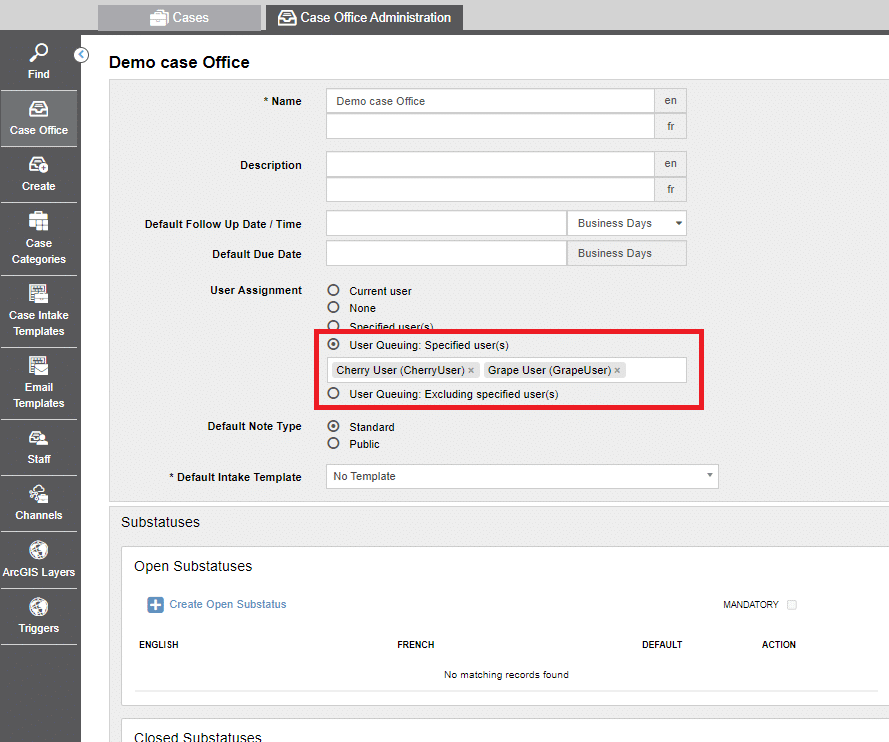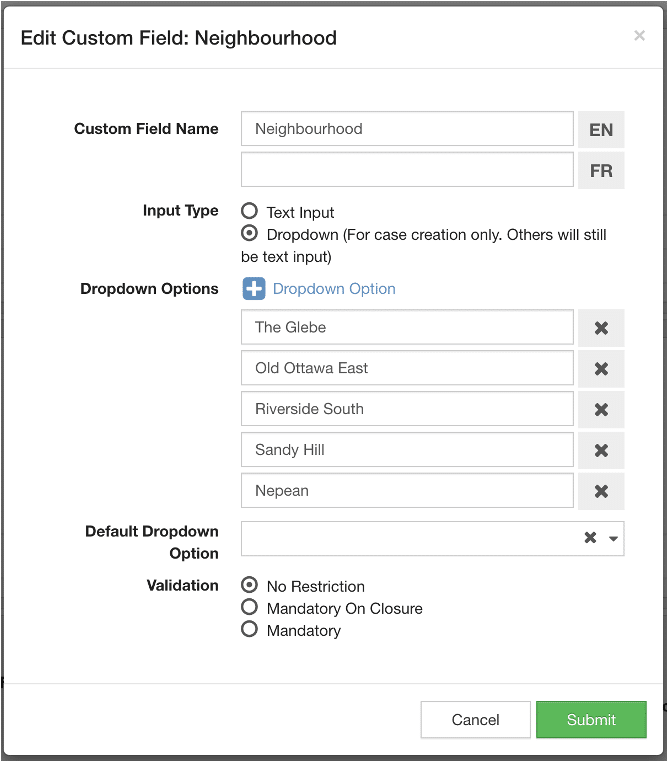Search Knowledge Base
What’s New in Release 2022.1
New Applications
Public Citizen Portal AccessE11 now offers a Public Citizen Portal where the general public can find information on all active issues within the community. Similar to the Web Form and personalized Citizen Case Portal, this can be customized to match your branding needs, and can be easily linked to your municipal website. Furthermore, Case Office Administrators have the ability to configure what information to make available in the portal including which categories get displayed, from which sources, whether or not to show Case due dates or sub-statuses, header and footer text and more.  For their part, the residents of your community get real-time visibility into the specific issues/concerns that are actively being worked using pin and heat maps, or in a table containing the types of information you have chosen to make available. They are able to quickly drill in to a specific category of interest, a specific time period, and choose whether to include resolved issues or not. This makes it easier to keep Citizens informed about the work that is being done, and also serves to reduce duplicate issue reports and unnecessary calls to staff.
For their part, the residents of your community get real-time visibility into the specific issues/concerns that are actively being worked using pin and heat maps, or in a table containing the types of information you have chosen to make available. They are able to quickly drill in to a specific category of interest, a specific time period, and choose whether to include resolved issues or not. This makes it easier to keep Citizens informed about the work that is being done, and also serves to reduce duplicate issue reports and unnecessary calls to staff.
Case Work
Auto-Distribution of Case Assignments to Staff To automate the balancing of workloads, two new queuing options are available to control how Cases are assigned across a designated pool of staff resources.
- User Queuing: Specified user(s): New Cases can be distributed to the user from a list you pre-specify that has been longest since receiving their last Case assignment.
- User Queuing: Excluding specified users: New Cases can be distributed to the user not in the list you pre-specify that has been longest since receiving their last Case assignment.
 Ability to Include Custom Fields for Cases Separate from the standard fields that can be specified for the Cases in your Case Office, you can now define Custom Fields that will be available when creating and editing Cases as well as for reporting.
Ability to Include Custom Fields for Cases Separate from the standard fields that can be specified for the Cases in your Case Office, you can now define Custom Fields that will be available when creating and editing Cases as well as for reporting.  Case Office Administrators have full control over
Case Office Administrators have full control over
- The Name to be used for the Custom Field
- The Input Type
- The options and, if desired, default to be used in Dropdown Fields, and
- Validation rules to be used
 Custom Domains for Portals and Emails AccessE11 now supports the use of a customized domain for online services and system emails. This takes the form of some customizable text followed by citizenrequests.online. For example, if your custom text was “mycity”, this would result in the following formats:
Custom Domains for Portals and Emails AccessE11 now supports the use of a customized domain for online services and system emails. This takes the form of some customizable text followed by citizenrequests.online. For example, if your custom text was “mycity”, this would result in the following formats:
- Web Form URL: https://mycity.citizenrequests.online/submit
- Citizen Portal URL: https://mycity.citizenrequests.online/cases
- Public Citizen Portal URL: https://mycity.citizenrequests.online/public
- Email Channels: email domain will be mycity.citizenrequests.online for all email channels
- Send From: Address: email domain will be mycity.citizenrequests.online
Email Changes Including Automated Case Updates on Replies For auto-generated emails, additional capabilities have been added to provide more flexibility in customizing the System Default address used for sending. Additionally, the specified Send From email is now used for Staff emails and no longer just for to public emails.  With this release, replies to emails from the System Default address can also be configured to automatically update the associated case with a new case note based on the reply content. Linked Case IDs for Staff Emails For Emails to staff on assignment, the embedded Case ID is now hyperlinked to take the user directly to the associated Case within the Web Application. This eliminates the multi-step navigation that was needed previously when dealing with emails while using the application. Streamlined Case Card Within the Case Office and My Cases Dashboards, the Case Card used for viewing and editing a selected case has been streamlined to hide certain fields where these are empty, giving more prominence to the most relevant information in this simplified view. If and when these fields are used, they will automatically be shown.
With this release, replies to emails from the System Default address can also be configured to automatically update the associated case with a new case note based on the reply content. Linked Case IDs for Staff Emails For Emails to staff on assignment, the embedded Case ID is now hyperlinked to take the user directly to the associated Case within the Web Application. This eliminates the multi-step navigation that was needed previously when dealing with emails while using the application. Streamlined Case Card Within the Case Office and My Cases Dashboards, the Case Card used for viewing and editing a selected case has been streamlined to hide certain fields where these are empty, giving more prominence to the most relevant information in this simplified view. If and when these fields are used, they will automatically be shown.
Reports
Ability to Schedule Reports It is now possible to schedule reports to execute in the future, including on a recurring basis. This covers the frequency of the report, the start date and the execution time, recurrence specifics, and an end date where report generation should stop. Scheduled reports can be distributed to intended recipients via email, either as a simple notification of availability or as an attachment. 
